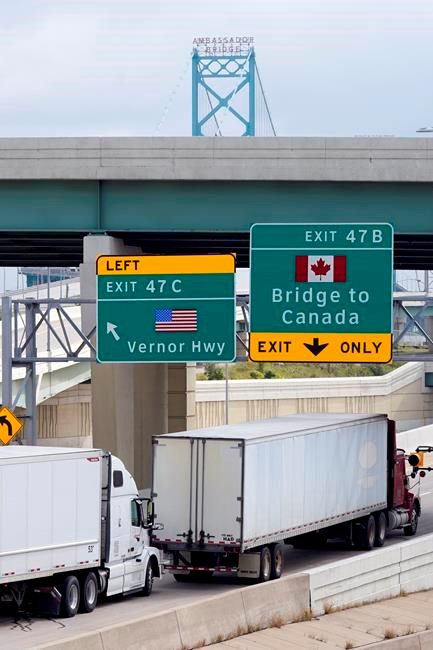TORONTO — Businesses on the U.S. side of the border are welcoming news that Canadians could soon be travelling south after the Biden administration said it would reopen land crossings in November.
Details remain scarce, including the specific date next month that fully-vaccinated Canadians will be able to cross the land border, but the news still comes as a relief to American businesses after nearly 20 months without Canadian customers.
"It means everything to me when it finally opens," said Betsy Smith, who runs a package receiving service as well as two sporting goods stores in Ogdensburg, N.Y.
"Cross-border shoppers that come and spend money in our whole community, losing them has been very bad for us."
She said the package service at her company, NAC Logistics, which provides Canadians a place to pick up online orders sent in the U.S., used to get about 2,000 packages a week and now it's down to about a hundred, forcing her to cut her staff by about half.
The bike and hockey shops she runs have also been hit hard because Canadians normally make up about half of sales.
“I’ve been hit in every direction with this. So I can’t wait, I can’t wait for the border to reopen.”
Cody McCormick, who manages two Duty Free Americas shops in Calais, Maine, said sales are at about a quarter of where they are normally, and that the whole town is hurting.
“The Canadian customers that come over here make a huge difference, especially in the travel and retail, a huge difference.”
He said that while the peak tourism season is well past, he still expects to see a big jump in travellers once the border reopens.
“With it being shut down as long as it was, I think a lot of people are going to take the opportunity before the snow flies to get over here and see family.”
Dottie Gallagher, chief executive of the chamber of commerce for the Buffalo, N.Y. area, said businesses in the tourism sector that depend on regular crossings are especially feeling a heavy sigh of relief as Canadians spend about a billion dollars a year in the region.
“We very much treat that bridge as a bridge, not a border, so it has really been a tremendous hardship.”
The reopening will mean Canadians will once again be able to travel south to catch NHL hockey games and all the benefits that brings to the community, Gallagher added.
“Everyone benefits from that in Buffalo, you know our restaurateurs, the bars, the nightclubs, etc., so even though we lost the summer to Canadian visitation, at least for the sporting season we’ll be able to get back to the new normal.”
Mary Lou Steward, deputy mayor of Blaine, Wash., said the reopening is great news for businesses, as well as the community itself.
She said Blaine has seen its revenue drop by upwards of 30 per cent because it's lost out on the sales tax on the many parcels Canadians order, the penny surplus per gallon the town receives from gasoline sales, as well as the general sales tax on dairy and other popular cross-border shopping goods. Other businesses in town, especially restaurants, have also seen a sharp drop in revenue.
“We really really do depend on the cross-border traffic."
She said she's concerned, however, about Canada's current requirement that anyone coming into the country show a recent negative polymerase chain reaction COVID-19 test.
“That will severely limit the cross-border shopping. Because who’s going to come down to fill up their tank of gas with fuel, and then pay $150 or $120 or whatever it is, for a PCR test to get back into Vancouver?"
The situation is even more dire in nearby Point Roberts, Wash., where chamber of commerce president Brian Calder said 90 per cent of the local economy was eliminated because of pandemic travel restrictions.
"Our economy is isolated. It's dependent on Canada, not neighbouring communities in the United States, so if you close that border, we're isolated; we're toast."
He said he was also concerned about the need for tests, since about half of the 1.5 million visitors they get each year spend an hour or less in the town.
Both are hopeful Canada will alter the policy to make it easier for cross-border travel, and bring the needed boost to the community.
“We’re really, really hoping that the Canadians come back," said Steward. "Go to our restaurants, shop in our shops and so on, to try and bring us back into life again.”
This report by The Canadian Press was first published Oct. 13, 2021.
-With a file from Brieanna Charlebois in Vancouver.
Ian Bickis, The Canadian Press




